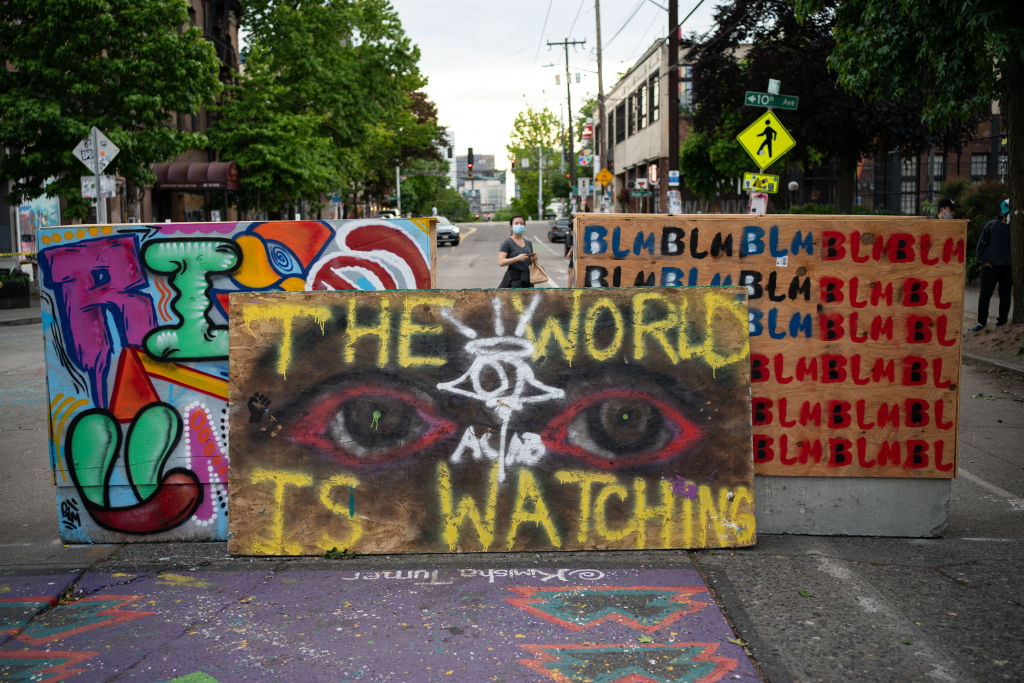It’s being sold by some as a glorious revolution, but what Western culture is really experiencing is a garden variety nervous breakdown. It’s hard to pinpoint exactly when it began, but it’s certainly well progressed, wouldn’t you agree?
The latest mania for gathering in furious mobs to denounce and expunge reminders of our past is what therapists call transference. We don’t hate our forebears anything like as much or as vigorously as we hate ourselves. How could we? They gave us everything we have. Instead, we are shamed by them. Born into what, statistically, is the easiest time in human history to be alive, what have we done or worked towards relative to the men and women cast in bronze or marble who came before?
If the answer to that question is not erasing the construct of gender — which it isn’t — but rather instant gratification, debt and addiction on a scale unprecedented in human history — which it is — then is it any wonder we find meeting the gaze of men like Christopher Columbus, Ulysses S. Grant, or Winston Churchill, who unflinchingly stare down at us from high in the places where we gather, a little on the tricky side? Who are you to judge us, grandpa? Who are you to look at me, grandma? Tear those statues down.
And why not do away with history altogether? It’s only another discipline, after all. Add it to science and religion to the list of so-called rules that seem increasingly to threaten our collective sense of entitlement and convenience, and the manner in which lately we claim to want to view the world. Truths once deemed foundational to all human progress in this way can unselfconsciously be junked like so much bad fashion. No one said a nervous breakdown can’t be exciting.
In the place of tradition, we embrace the mutable values of corporations only too keen to reflect back at us whatever it is they think we want to hear. A cursory look at the expensively made adverts that intersperse everything that passes for entertainment makes this truth self evident. Your bank, your running shoe manufacturer, your producer of shaving products, all of them have important messages for you about how to live a good and meaningful life, as if you must be a human being in a state of existential crisis. Which of course you are. Morality as delivered by the profit motive: as good a terminus for capitalism as any.
It wasn’t so long ago advertising was about encouraging you to consume guiltlessly. How innocent those times now seem. Today a whole industry is geared toward promoting guilty consumption. It wants you to consume, but to feel dreadful about it, and simultaneously to feel by consuming you’re saving the world. Saving humanity. It can’t be easy at all for the ad guys — let’s hope they still get paid the guilt-inducing megabucks. But it’s a very confusing message to process for the millions who nightly lie slumped in front the telly, blitzed as we are anyway by all the chaos out there, and by junk food and booze. In their way, the slickly produced 45-second corporate virtue signals beamed endlessly into our living rooms are a perfect metaphor for the nullity now metastasizing at the heart of our culture — ‘if you care, too, give us your money’. The vacuum into which we now implode.
Why not embrace guilt? Sisters, brothers, don’t fight it. There’s no longer a single aspect of modern life that cannot be weaponized and used against the individual for the purpose of shaming. Everything you are, everything you think and everything you do or have ever done is now a cudgel that at any moment can be used to beat and humiliate you. Don’t believe me? Ask J.K. Rowling.
Slowly at first, but now seemingly with total abandon, we have become addicted to guilt. We’re wide open to receiving it — we can’t get enough of it — even when we don’t understand all that well exactly for what it is we should feel guilty. How else to explain the prominence of an under-educated teenager as the face of the greatest and most complex guilt trip of the them all, the threat of climate change? Greta Thunberg yells at us — ‘how dare you?‘ — and we experience a thrill that is visceral, the mad kick of burning shame. She’s only 17 but she wears the guilt of billions like a personal brand. Jesus didn’t pull off his first miracle until he was 33.
Is social media to blame for all this? Almost certainly. Not only does it make easier than ever before profoundly destructive cultural negative feedback loops (idiot somewhere says something idiotic — ‘ban the police!’ — media personalities with millions of followers amplify it for indignation clicks, traditional media picks it up for broadcast, idiotic idea gets improbably enormous consideration and enters public discourse), but it also encourages debate that seems ineluctably to lead to competitive comparisons of oppression (‘you are oppressing me with your oppressive opinions born of your unconscious oppressor mindset’). The recent term for this phenomenon is ‘privilege’. Privilege significantly handicaps whoever possesses it in the great game of identity politics that now seems so successfully to be laying waste to our societies.
[special_offer]
Identity politics — or divide and conquer, to give it its more ancient name — encourages fixation on what separates us and the myriad ways in which we are, or have been, oppressed, rather than the common humanity that unites us. Switch on the news. You’ll see it’s very effective.
How does a culture recover from a nervous breakdown? They say lifestyle change always helps. Maybe if the other side of the COVID pandemic really is economic armageddon, as many fear, then that is what will happen, whether we like it or not. Finally, we will be united by common struggle. But look at how quickly that brief sense of unity brought about by the great COVID scare has passed. It has collapsed into more madness, division and bipolarity.
Not everyone recovers from a nervous breakdown. All too often they lead to suicide.


















